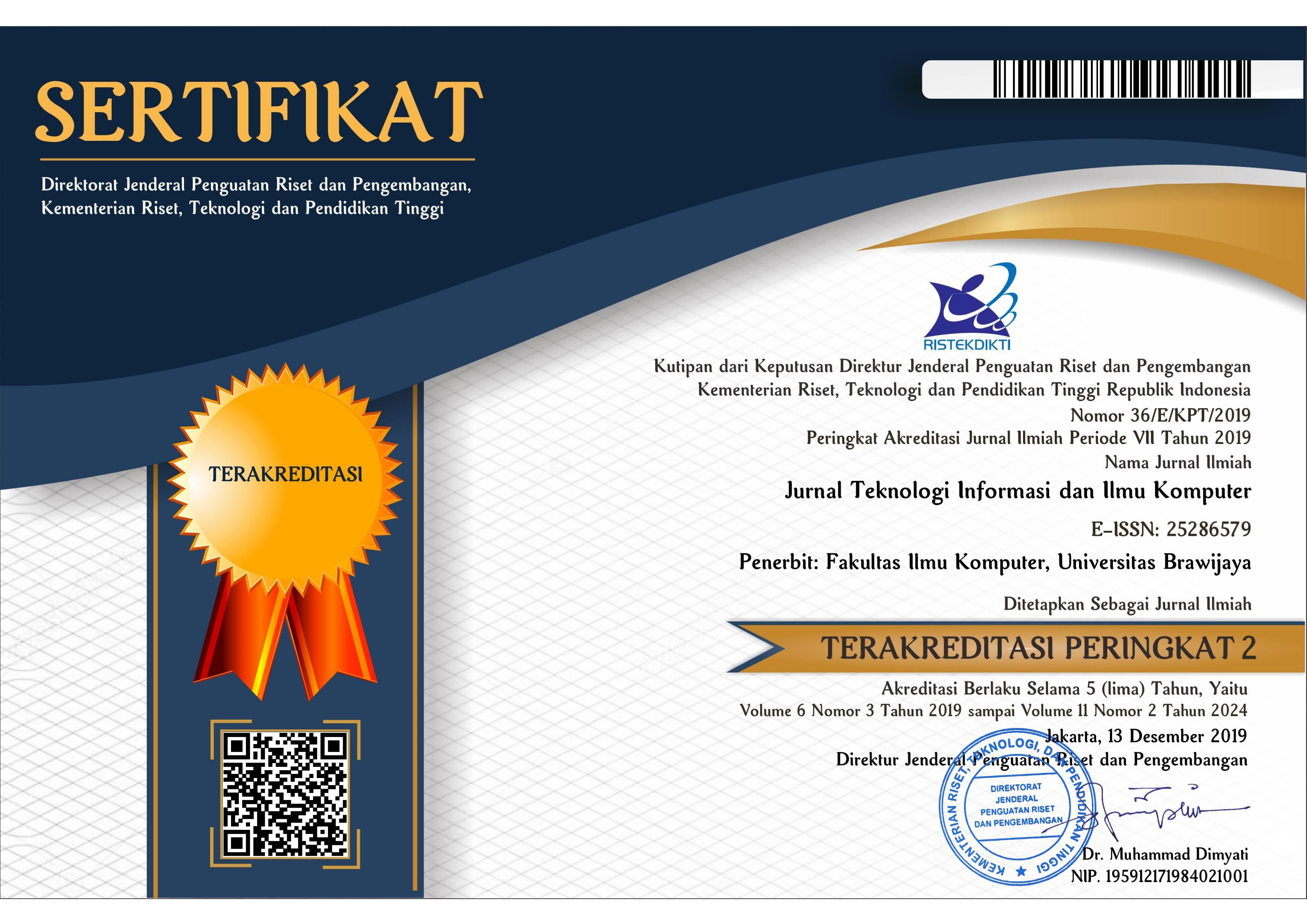Analisis Sentimen pada Data Saran Mahasiswa Terhadap Kinerja Departemen di Perguruan Tinggi Menggunakan Convolutional Neural Network
DOI:
https://doi.org/10.25126/jtiik.2021854842Abstrak
Review atau saran dari customer dapat menjadi sangat penting bagi penyedia layanan, begitu pula saran dari mahasiswa mengenai layanan sebuah unit kerja di perguruan tinggi. Review menjadi penting karena dapat menjadi indikator kinerja penyedia layanan. Pengolahan review juga sangat penting karena dapat menjadi referensi untuk pengambilan keputusan dan peningkatan layanan yang lebih baik ke depannya. Penelitian ini menerapkan analisis sentimen pada data saran atau review mahasiswa terhadap kinerja unit kerja atau departemen di perguruan tinggi, yaitu Politeknik Caltex Riau. Analisis sentimen dilakukan dengan menggunakan Convolutional Neural Network (CNN) dan word embedding Word2vec sebagai representasi kata. CNN merupakan metode yang memiliki performa yang baik dalam mengklasifikasi teks, yaitu dengan teknik convolutional yang menggabungkan beberapa window kata pada kalimat dan mengambil window yang paling representative. Word2Vec digunakan sebagai representasi data saran dan inputan awal pada CNN, dimana Word2Vec merupakan dense vectors yang dapat merepresentasikan hubungan antar kata pada data saran dengan baik. Saran mahasiswa dapat mengandung kalimat yang sangat panjang, karena itu perpaduan Word2Vec sebagai representasi kata dan CNN dengan teknik convolutional, dapat menghasilkan representasi yang representative dari kalimat panjang tersebut. Penelitian ini menggunakan dua arsitektur CNN, yaitu Simple CNN dan DoubleMax CNN untuk mengidentifikasi pengaruh kompleksitas arsitektur terhadap hasil klasifikasi sentimen. Berdasarkan hasil pengujian, DoubleMax CNN dapat mengklasifikasi sentimen pada saran mahasiswa dengan sangat baik, yaitu mencapai Akurasi tertinggi sebesar 98%, Recall 97%, Precision 98% dan F1-Score 98%.
Abstract
Student’s reviews about department performance can be essential for a college for it can be used to evaluate the department performance and to take an immediate action to improve its performance. This research applies sentiment analysis in the student’s reviews of college department in Politeknik Caltex Riau. Convolutional Neural Network and Word2Vec are employed to analyze the sentiment. CNN is known for its good performance in text classification by applying a convolutional technique to the input sentences. Word2Vec is used as word representation and as an input to the CNN. Word2Vec are dense vectors which can represent the relationship between words excellently. Student’s reviews can be a long sentence; hence the combination of Word2Vec as word representation and CNN with convolutional technique can produce a representative fiture from that long sentence. This research utilizes two CNN architectures, which are Simple CNN dan DoubleMax CNN to identify the effect of the complexity of CNN architecture to final result. Our experiments show that DoubleMax CNN has a great performance in classifying sentiment in the student’s reviews with the best Accuracy value of 98%, Recall 97%, Precision 98% and F1-Score value of 98%.
Downloads
Referensi
AL KABIR, A.H., BASUKI, S. & WICAKSONO, G.W., 2019. Analisis sentimen kritik dan saran pelatihan aplikasi teknologi informasi (PATI) menggunakan algoritma support vector machine (SVM). Jurnal Repositor, 1(1), hal.39.
ATTABI, A.W., MUFLIKHAH, L. & FAUZI, M.A., 2018. Penerapan Analisis Sentimen untuk Menilai Suatu Produk pada Twitter Berbahasa Indonesia dengan Metode Naïve Bayes Classifier dan Information Gain. Jurnal Pengembangan Teknologi Informasi dan Ilmu Komputer, 2(11), hal.4548–4554.
DOZAT, T., 2016. Incorporating Nesterov Momentum into Adam. ICLR Workshop, (1), hal.2013–2016.
GUPTA, P., TIWARI, R. & ROBERT, N., 2016. Sentiment analysis and text summarization of online reviews: A survey. In: International Conference on Communication and Signal Processing, ICCSP 2016, hal.241–245.
HAMZAH, A., 2014. Sentiment Analysis Untuk Memanfaatkan Saran Kuesioner Dalam Evaluasi Pembelajaran Dengan Menggunakan Naive Bayes Classifier (NBC). In: Prosiding Seminar Nasional Aplikasi Sains & Teknologi (SNAST), hal.159.
JUWIANTHO, H., SETIAWAN, E.I., SANTOSO, J. & PURNOMO, M.H., 2020. Sentiment Analysis Twitter Bahasa Indonesia Berbasis Word2Vec Menggunakan Deep Convolutional Neural Network. Jurnal Teknologi Informasi dan Ilmu Komputer (JTIIK), 7(1), hal.181–188.
KIM, H. & JEONG, Y.S., 2019. Sentiment classification using Convolutional Neural Networks. Applied Sciences (Switzerland), 9(11), hal.1–14.
KIM, Y., 2014. Convolutional neural networks for sentence classification. In: EMNLP 2014 - 2014 Conference on Empirical Methods in Natural Language Processing, Proceedings of the Conference. hal.1746–1751.
KINGMA, D.P. & BA, J.L., 2015. Adam: A method for stochastic optimization. In: 3rd International Conference on Learning Representations, ICLR 2015 - Conference Track Proceedings, hal.1–15.
LIU, B., 2010. Sentiment Analysis and Subjectivity. In: N. Indurkhya & F. J. Damerau (ed.), Handbook of Natural Language Processing, Chapman & Hall/CRC, hal.272–277.
MIKOLOV, T., CHEN, K., CORRADO, G. & DEAN, J., 2013. Efficient estimation of word representations in vector space. In: 1st International Conference on Learning Representations, ICLR 2013 - Workshop Track Proceedings, hal.1–12.
PANG, B. & LEE, L., 2008. Opinion Mining and Sentiment Analysis. Foundations and Trends in Information Retrieval, 2(1-2), hal.1-135.
RAUT, V.B. & LONDHE, D.D., 2014. Opinion mining and summarization of hotel reviews. In: 6th International Conference on Computational Intelligence and Communication Networks, CICN 2014, hal.556–559.
RUDER, S., 2016. An overview of gradient descent optimization algorithms. arXiv preprint arXiv:1609.04747. [online] Tersedia di: <https://arxiv.org/abs/1609.04747>
SALAM, N.S.N., SUPIANTO, A.A. & PERDANAKUSUMA, A.R., 2019. Analisis Sentimen Opini Mahasiswa Terhadap Saran Kuesioner Penilaian Kinerja Dosen dengan Menggunakan TF-IDF dan K-Nearest Neighbor. Jurnal Pengembangan Teknologi Informasi dan Ilmu Komputer, [online] 3(6), hal.6148–6156. Tersedia di: <http://j-ptiik.ub.ac.id/index.php/j-ptiik/article/view/5649>.
SEYEDITABARI, A., TABARI, N. & ZADROZNY, W., 2018. Emotion Detection in Text: a Review. arXiv preprint arXiv: 1806.00674. [online] Tersedia di: <https://arxiv.org/abs/1806.00674>
TSYTSARAU, M. & PALPANAS, T., 2012. Survey on mining subjective data on the web. Data Mining and Knowledge Discovery, 24(3), hal.478–514.
WAHID, D.H. & SN, A., 2016. Peringkasan Sentimen Esktraktif di Twitter Menggunakan Hybrid TF-IDF dan Cosine Similarity. IJCCS (Indonesian Journal of Computing and Cybernetics Systems), 10(2), hal.207.
WICAKSONO, A.F., VANIA, C., DISTIAWAN, B.T. & ADRIANI, M., 2014. Automatically building a corpus for sentiment analysis on Indonesian tweets. In: Proceedings of the 28th Pacific Asia Conference on Language, Information and Computation, PACLIC 2014. hal.185–194.
ZEILER, M.D., 2014. Adadelta: An Adaptive Learning Rate Method. arXiv preprint arXiv: 1212.5701. [online] Tersedia di: <https://arxiv.org/abs/1212.5701>
Unduhan
Diterbitkan
Terbitan
Bagian
Lisensi

Artikel ini berlisensi Creative Common Attribution-ShareAlike 4.0 International (CC BY-SA 4.0)
Penulis yang menerbitkan di jurnal ini menyetujui ketentuan berikut:
- Penulis menyimpan hak cipta dan memberikan jurnal hak penerbitan pertama naskah secara simultan dengan lisensi di bawah Creative Common Attribution-ShareAlike 4.0 International (CC BY-SA 4.0) yang mengizinkan orang lain untuk berbagi pekerjaan dengan sebuah pernyataan kepenulisan pekerjaan dan penerbitan awal di jurnal ini.
- Penulis bisa memasukkan ke dalam penyusunan kontraktual tambahan terpisah untuk distribusi non ekslusif versi kaya terbitan jurnal (contoh: mempostingnya ke repositori institusional atau menerbitkannya dalam sebuah buku), dengan pengakuan penerbitan awalnya di jurnal ini.
- Penulis diizinkan dan didorong untuk mem-posting karya mereka online (contoh: di repositori institusional atau di website mereka) sebelum dan selama proses penyerahan, karena dapat mengarahkan ke pertukaran produktif, seperti halnya sitiran yang lebih awal dan lebih hebat dari karya yang diterbitkan. (Lihat Efek Akses Terbuka).















